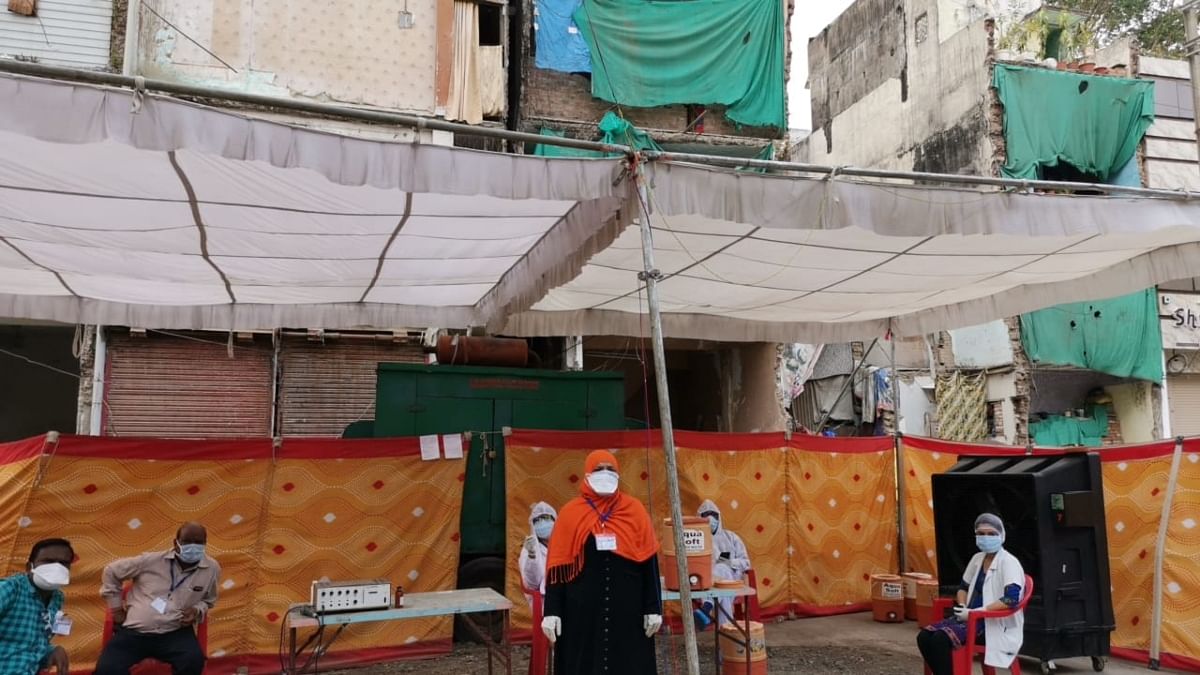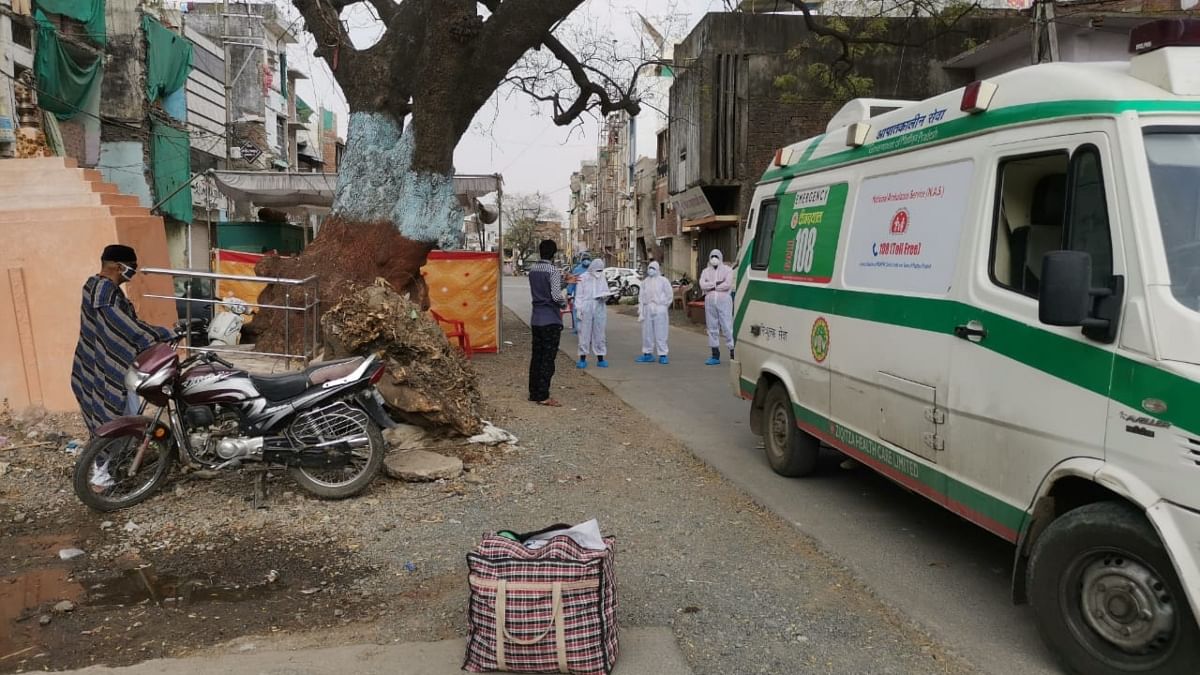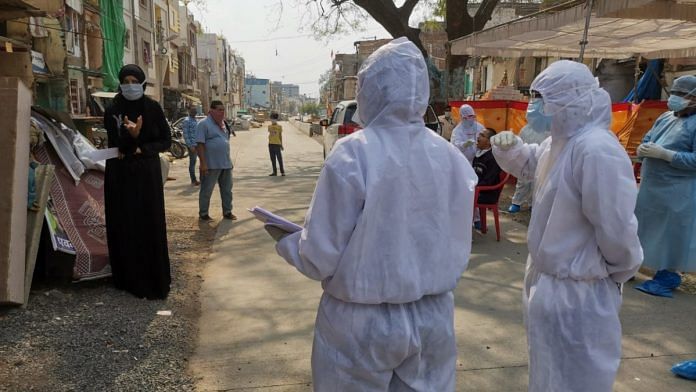Indore: The office of Indore’s chief medical and health officer (CMHO) was buzzing with activity Monday morning — an unusual sight in a city under lockdown.
Two doctors in masks, head covers and gloves were lugging swab collection kits and thermocol containers through a long corridor. Other healthcare workers were waiting for their teams to assemble before they could go on their daily rounds of sample-collection and contact-tracing.
Ever since the cleanest city in India emerged as an unexpected Covid-19 hotspot, the district administration of Indore has been scrambling to arrest the spread of the infection.
According to the data released by the CMHO’s office Monday night, the number of cases in Indore stood at 362 — more than half the number reported in Madhya Pradesh.
But what is peculiar in Indore is that its coronavirus-positive patients do not have a travel history, unlike in other hotspot cities such as Mumbai and Delhi, and a majority of them were detected in low-income pockets.
“There are certain areas that are hotspots, including Tanjim Nagar and Tatpatti Bakhal. These are mostly densely populated areas… None of the patients have a history of travel. So either they must’ve gotten it from people who travelled through Indore or from their primary or tertiary contacts,” Chief Medical Officer Dr Pravin Jadia told ThePrint.
To contain the virus in Indore, the district administration began a mammoth contact-tracing and sampling exercise from 25 March — three days after the city reported the death of its first Covid-19 patient.
As many as 80 teams, comprising 160 medical personnel, are involved in this exercise. The teams have been collecting at least 300 samples a day.

Also read: Has politics in Madhya Pradesh damaged its battle against coronavirus?
What the exercise is all about
The teams of health workers, including doctors, dentists, AYUSH medical officers and paramedical staff, have been tasked with collecting samples from the city’s 18 hotspot areas, and tracing the primary and secondary contacts of positive patients.
Dr Nitesh Choudhary, who has been overseeing the entire exercise, told ThePrint there are four teams — contact survey team, RRT team or the rapid response team, medical mobile unit or MMU, and the sampling team.
“The contact survey team surveys the contacts of Covid-19 patients. The RRT team or the rapid response team… checks on people who have respiratory issues and take their samples if needed… the medical mobile unit distributes medicines across Indore,” said Dr Choudhary, adding that the sampling team takes samples of all the primary contacts of positive patients.
The number of teams varies every day based on the number of samples that have to be collected on a given day.
On Monday, when ThePrint visited the CMHO’s office, about 40 RRT, 16 sampling, 12 MMU and 12 contact survey teams were being sent out across the city.
Each team was assigned to 12 areas within five demarcated zones — Khajurana, Azad Nagar, Rau, Malharganj and Hukum Chand.
Dr Ritu Chouhan, one of the Ayush doctors who has been working with one of the MMU teams for the past 15 days, explained that the teams are changed every week.
“We were working in Gandhinagar. From today (Monday), we have been allotted new areas… I will now work in Sarafa [bazaar],” she said.
On Monday, the teams collected 401 samples from the city, according to the CMHO’s data.
According to Dr Jadia, a total of 4,000 people had been kept under surveillance, some of who have been released, while nearly 3,000, who are under quarantine, had completed the 14-day isolation period.
This mammoth exercise, however, has been far from easy.
Also read: Bhopal’s health dept, led by its IAS secy, becomes new corona hotspot, half city’s cases linked
‘Hostile’ residents
The teams have often met with hostility from the residents and in some cases were even manhandled.
Healthcare workers and police personnel have come under attack in two areas of the city. On 1 April, stones were pelted on two doctors in Tatpatti Bakhal. Then on 9 April, a police team came under attack in Chandan Nagar area.
Dr Choudhary, however, said the situation seems to be different now.
“The people initially refused to give their samples… they were afraid of testing positive for coronavirus. They resisted our team. But, slowly, as awareness grew, everyone started testing. Now more and more people want to test for coronavirus,” he told ThePrint.
Inside a hotspot
The city’s first Covid-19 patient, 65-year-old Abdul Hameed, was a resident of the densely populated Tatpatti Bakhal area. He had no travel history.
Hameed, who was admitted to the Maharaja Yeshwantrao Hospital for pneumonia, died on 22 March. Two days later his reports revealed that he had been infected with coronavirus.
Healthcare officials were immediately sent to trace Hameed’s contacts.
At least four members of Hameed’s family were quarantined on 30 March after testing positive. This included his son, daughter-in-law and wife.
Since 22 March, 85 of the area’s residents have been quarantined, of whom 12-13 tested positive, according to Accredited Social Health Activist (ASHA) worker Fiza Fatima’s estimates.
The entire lane where Hameed lived was cordoned off with police barricades and a medical camp set up too.
“We’re working about 18-19 hours. We’re watching the area properly. The good thing is we’re receiving fewer reports now. Only those we’ve quarantined, have tested positive,” said Fatima, 37, who has been stationed at the camp since 29 March.
Fatima was also present during the stone-pelting incident of 1 April.
“They (local residents) have fears (of being picked up) due to NRC (National Register of Citizens) and CAA (Citizenship Amendment Act). Most of the people here are labourers. They don’t have any support. They became scared that people were being quarantined, and that many people are being taken away,” she added.
Fatima said she was also threatened by the local residents after she started surveilling the area.
A day before the (stone pelting) incident, 50-60 people had come to her house, which is close to Tatpatti Bhakal, and threatened her and her family. “They told me that you are getting Muslims picked up… I had to seek police protection,” she said.
ThePrint caught a glimpse of people’s reluctance to go to an isolation centre when a family of a 45-year-old Covid-19 patient was being tested.
The medical personnel were trying to persuade the nine-member family to go to an isolation centre, but they remained reluctant.
According to the administration’s guidelines, asymptomatic high-risk contacts have to be sent to isolation facilities.
“I beg you to please heed to our advice,” Dr Harsh Chansoria, a dentist who’s been collecting samples, told the family with folded hands.
“This happens too often. People continue to raise objections. We encounter several patients who don’t want the tests to be done. In those situations, we have to counsel the patients,” he told ThePrint.
A little while later, a 55-year-old man, whose samples tested positive, came out of his house, wearing a mask. “I’m glad I’m being taken there. I will get better,” he told ThePrint, while waiting for an ambulance to take him to hospital.

Also read: MP’s growing Covid-19 crisis: Cases rising, govt paralysed after top officials test positive




Very good information from you! Thanks. Continue this good service. This will give a confidence to public to come forward to tests and agreeing for treatment in isolation to contain the spread of Corona virus.